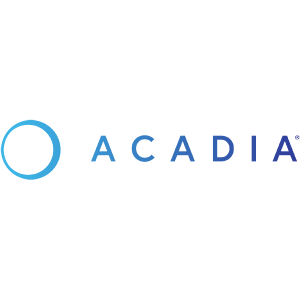Acadia Pharmaceuticals to Present Data on Pimavanserin in Patients with Parkinson’s Disease Dementia with Psychosis from the HARMONY trial at the 14th Clinical Trials on Alzheimer’s Disease (CTAD) Conference
The poster presentation summarizes results of a post-hoc analysis of pimavanserin treatment of hallucinations and delusions in a subgroup of patients with Parkinson’s disease dementia from the Phase 3 HARMONY trial evaluating pimavanserin as a potential treatment of dementia-related psychosis.
CTAD Accepted Presentation:
-
Poster Presentation (#LRP2): Pimavanserin treatment of hallucinations and delusions in patients with Parkinson’s disease dementia: post-hoc analysis of the HARMONY trial, available to view on
November 9, 2021 . Presenting author:Daniel Weintraub , M.D., Departments of Psychiatry and Neurology,Perelman School of Medicine at theUniversity of Pennsylvania ,Philadelphia, PA.
About Pimavanserin
Pimavanserin is a selective serotonin inverse agonist and antagonist preferentially targeting 5-HT2A receptors. These receptors are thought to play an important role in neuropsychiatric disorders. In vitro, pimavanserin demonstrated no appreciable binding affinity for dopamine (including D2), histamine, muscarinic, or adrenergic receptors. Pimavanserin was approved for the treatment of hallucinations and delusions associated with Parkinson’s disease psychosis by the
About
Acadia is trailblazing breakthroughs in neuroscience to elevate life. For more than 25 years we have been working at the forefront of healthcare to bring vital solutions to people who need them most. We developed and commercialized the first and only approved therapy for hallucinations and delusions associated with Parkinson’s disease psychosis. Our late-stage development efforts are focused on dementia-related psychosis, negative symptoms of schizophrenia and Rett syndrome, and in early-stage clinical research we are exploring novel approaches to pain management, and cognition and neuropsychiatric symptoms in central nervous system disorders. For more information, visit us at www.acadia-pharm.com and follow us on LinkedIn and Twitter.
Important Safety Information and Indication for NUPLAZID® (pimavanserin)
Indication
NUPLAZID is indicated for the treatment of hallucinations and delusions associated with Parkinson’s disease psychosis.
Important Safety Information
WARNING: INCREASED MORTALITY IN ELDERLY PATIENTS WITH DEMENTIA-RELATED PSYCHOSIS
- Elderly patients with dementia-related psychosis treated with antipsychotic drugs are at an increased risk of death.
- NUPLAZID is not approved for the treatment of patients with dementia-related psychosis unrelated to the hallucinations and delusions associated with Parkinson’s disease psychosis.
- Contraindication: NUPLAZID is contraindicated in patients with a history of a hypersensitivity reaction to pimavanserin or any of its components. Rash, urticaria, and reactions consistent with angioedema (e.g., tongue swelling, circumoral edema, throat tightness, and dyspnea) have been reported.
-
Warnings and Precautions: QT Interval Prolongation
- NUPLAZID prolongs the QT interval. The use of NUPLAZID should be avoided in patients with known QT prolongation or in combination with other drugs known to prolong QT interval including Class 1A antiarrhythmics or Class 3 antiarrhythmics, certain antipsychotic medications, and certain antibiotics.
- NUPLAZID should also be avoided in patients with a history of cardiac arrhythmias, as well as other circumstances that may increase the risk of the occurrence of torsade de pointes and/or sudden death, including symptomatic bradycardia, hypokalemia or hypomagnesemia, and presence of congenital prolongation of the QT interval.
-
Adverse Reactions: The common adverse reactions (≥
2% for NUPLAZID and greater than placebo) were peripheral edema (7% vs2% ), nausea (7% vs4% ), confusional state (6% vs3% ), hallucination (5% vs3% ), constipation (4% vs3% ), and gait disturbance (2% vs <1% ).
-
Drug Interactions:
- Coadministration with strong CYP3A4 inhibitors (e.g., ketoconazole) increases NUPLAZID exposure. Reduce NUPLAZID dose to 10 mg taken orally as one tablet once daily.
- Coadministration with strong or moderate CYP3A4 inducers reduces NUPLAZID exposure. Avoid concomitant use of strong or moderate CYP3A4 inducers with NUPLAZID.
Dosage and Administration
Recommended dose: 34 mg capsule taken orally once daily, without titration.
NUPLAZID is available as 34 mg capsules and 10 mg tablets.
Please read the full Prescribing Information including Boxed WARNING.
Forward-Looking Statements
Statements in this press release that are not strictly historical in nature are forward-looking statements. These statements include but are not limited to statements regarding the timing of future events. These statements are only predictions based on current information and expectations and involve a number of risks and uncertainties. Actual events or results may differ materially from those projected in any of such statements due to various factors, including the risks and uncertainties inherent in drug development, approval and commercialization. For a discussion of these and other factors, please refer to Acadia’s annual report on Form 10-K for the year ended
View source version on businesswire.com: https://www.businesswire.com/news/home/20211025005145/en/
Media Contact:
Deb Kazenelson
(818) 395-3043
media@acadia-pharm.com
Investor Contact:
(858) 261-2771
ir@acadia-pharm.com
Source:







